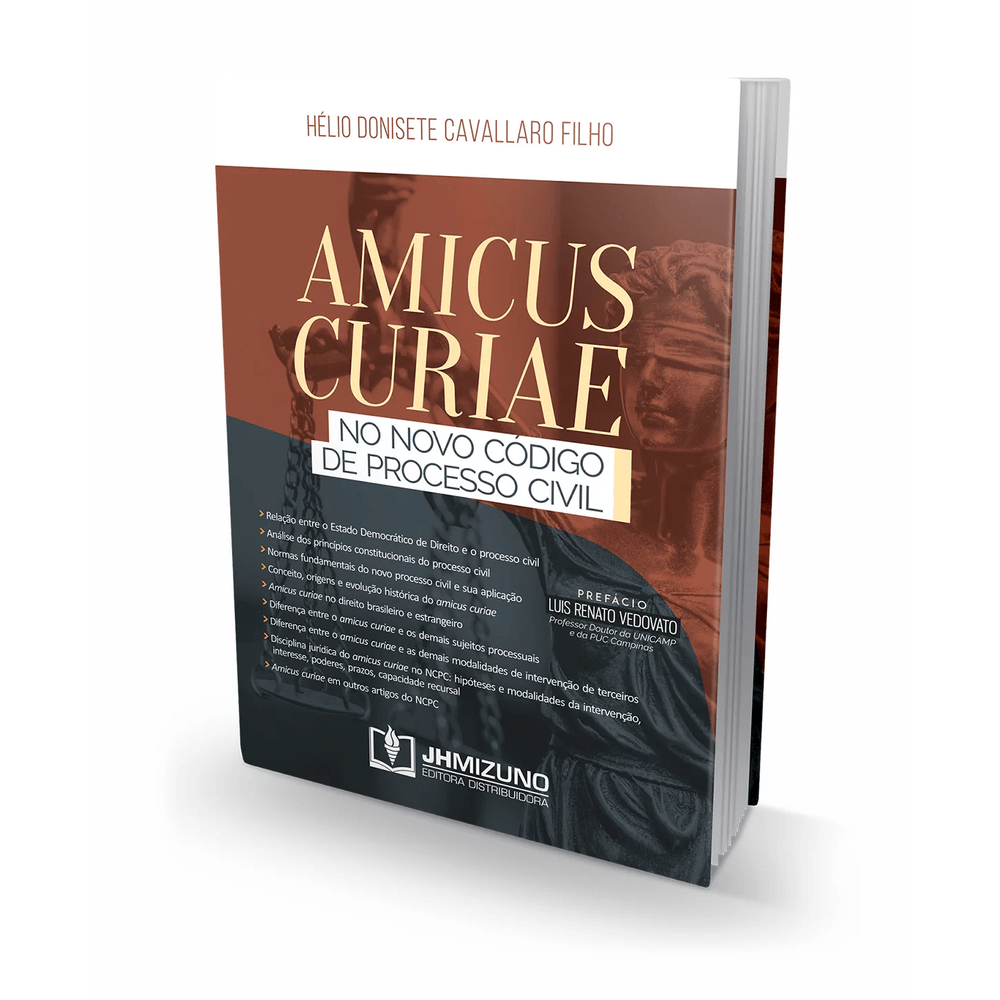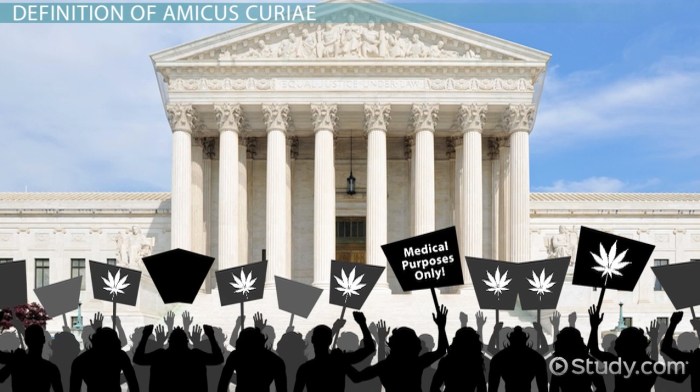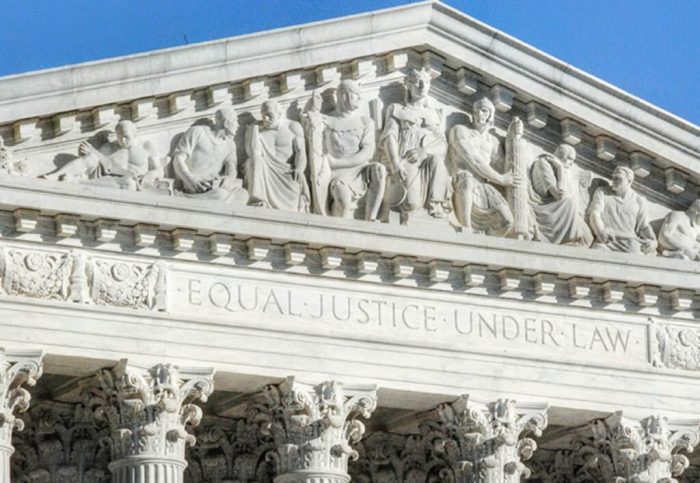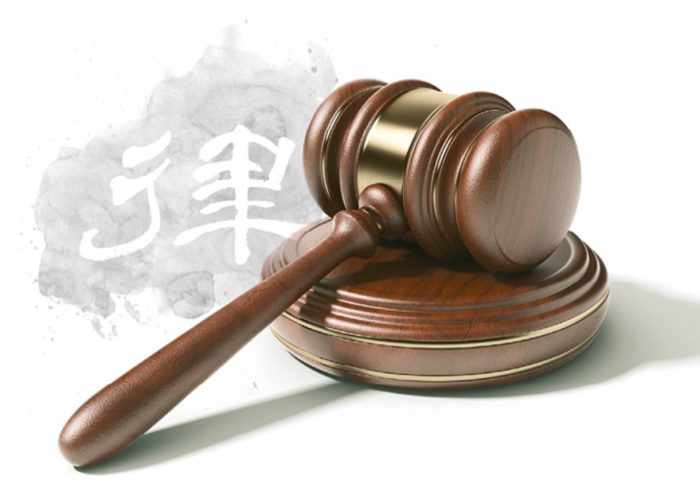Delving into the realm of amicus curiae ap gov definition, we embark on a journey to unravel the intricacies of this legal concept. From its historical roots to its contemporary significance, this guide provides a comprehensive exploration of amicus curiae, its role in shaping legal outcomes, and its impact on public policy.
In this in-depth analysis, we delve into the various types of amicus curiae briefs, the criteria for determining their status, and notable examples that have influenced landmark legal cases.
Amicus Curiae Definition

An amicus curiae, meaning “friend of the court” in Latin, refers to an individual or organization that is not directly involved in a legal proceeding but is permitted by the court to provide information or arguments on a matter of law that is relevant to the case.
Amicus curiae submissions are typically made in the form of written briefs or oral arguments and aim to assist the court in reaching a well-informed decision. They provide an opportunity for parties with expertise or a particular interest in the subject matter of the case to share their perspectives and insights, thereby contributing to a more comprehensive understanding of the issues involved.
Historical Origins and Development
The concept of amicus curiae has its roots in ancient Roman law, where it was recognized that individuals outside of the case could provide valuable assistance to the court. Over time, the practice evolved and became firmly established in common law systems, including the United States.
In the United States, the Supreme Court has played a significant role in shaping the role of amicus curiae. In 1943, the Court adopted Rule 29 of the Federal Rules of Appellate Procedure, which governs the submission of amicus curiae briefs.
This rule set forth specific criteria for granting amicus status and established the practice of inviting amicus participation in certain cases.
Types of Amicus Curiae

Amicus curiae briefs come in various types, each serving a specific purpose in the legal process. These briefs can be categorized based on the party submitting them and their relationship to the case.
Interest Groups
Interest groups are organizations or associations with a vested interest in the outcome of a case. They may represent a particular industry, profession, or advocacy group. Amicus briefs from interest groups aim to provide the court with specialized knowledge or perspectives on issues relevant to the case.
Government Entities
Federal, state, and local government entities may file amicus briefs to express their views on matters of public importance or to protect their interests. These briefs can provide the court with insights into the potential impact of a ruling on government policies or programs.
Academic Institutions
Universities and other academic institutions may submit amicus briefs to share their expertise and research findings. These briefs can help the court understand complex legal issues or provide historical or comparative perspectives.
Individuals
In rare cases, individuals may be granted amicus curiae status if they possess unique knowledge or expertise relevant to the case. These briefs can provide the court with a personal perspective or shed light on issues that may not be adequately addressed by other parties.
Process for Filing Amicus Curiae Briefs

Filing an amicus curiae brief involves specific steps and procedures that ensure the proper submission and consideration of the brief by the court.
To initiate the process, interested parties must first obtain permission from the court to file an amicus curiae brief. This permission is typically sought through a motion filed with the court, which Artikels the party’s interest in the case, the relevance of the brief to the issues being considered, and any potential conflicts of interest.
Motion for Leave to File
The motion for leave to file should include the following information:
- The name and contact information of the party filing the brief
- The case name and docket number
- A brief statement of the party’s interest in the case
- A brief description of the arguments to be made in the brief
- Any potential conflicts of interest
Once the court grants permission to file an amicus curiae brief, the party must adhere to specific rules and guidelines governing the content and format of the brief.
Impact of Amicus Curiae Briefs

Amicus curiae briefs have the potential to significantly impact legal outcomes. They can provide the court with additional perspectives and expertise, which can help to inform the court’s decision-making process. In some cases, amicus curiae briefs have even been credited with swaying the court’s decision.One
An amicus curiae, meaning “friend of the court” in Latin, is a person or organization that is not a party to a legal case but is permitted to submit information to the court to assist in its decision-making. This concept is often discussed in AP government classes, where students learn about the role of the judiciary in the American legal system.
In Andre Dubus’s short story ” A Father’s Story “, the protagonist, David, grapples with the complexities of fatherhood and the legal consequences of his actions. Through David’s experiences, readers gain insights into the challenges of balancing personal responsibilities with legal obligations, a theme that resonates with the broader concept of amicus curiae in AP government studies.
of the most important potential impacts of amicus curiae briefs is their ability to shape legal precedents. When a court relies on an amicus curiae brief in making its decision, that decision can become binding precedent for future cases. This means that the arguments and analysis presented in the amicus curiae brief can have a lasting impact on the development of the law.Amicus
curiae briefs can also play a role in shaping public policy. By bringing new perspectives and expertise to the court’s attention, amicus curiae briefs can help to raise awareness of important issues and to influence the way that the court thinks about those issues.
This can lead to changes in the way that the government regulates certain industries or the way that courts interpret certain laws.
Ethical Considerations and Potential Biases
While amicus curiae briefs can have a positive impact on legal outcomes, there are also some ethical considerations and potential biases that must be taken into account. One concern is that amicus curiae briefs may be used to advocate for special interests.
This can happen when an amicus curiae brief is filed by a group or organization that has a financial or ideological stake in the outcome of the case. In such cases, the amicus curiae brief may not be objective and may instead be designed to promote the interests of the group or organization that filed it.Another
concern is that amicus curiae briefs may be used to delay or obstruct the legal process. This can happen when an amicus curiae brief is filed for the purpose of delaying the proceedings or making it more difficult for the court to reach a decision.
In such cases, the amicus curiae brief may be seen as an abuse of the legal process.It is important to note that not all amicus curiae briefs are biased or unethical. However, it is important to be aware of the potential for bias and to carefully consider the source of any amicus curiae brief that you read.
Role in Shaping Legal Precedents and Public Policy
Amicus curiae briefs can play a significant role in shaping legal precedents and public policy. By providing the court with additional perspectives and expertise, amicus curiae briefs can help to inform the court’s decision-making process. In some cases, amicus curiae briefs have even been credited with swaying the court’s decision.When
a court relies on an amicus curiae brief in making its decision, that decision can become binding precedent for future cases. This means that the arguments and analysis presented in the amicus curiae brief can have a lasting impact on the development of the law.Amicus
curiae briefs can also play a role in shaping public policy. By bringing new perspectives and expertise to the court’s attention, amicus curiae briefs can help to raise awareness of important issues and to influence the way that the court thinks about those issues.
This can lead to changes in the way that the government regulates certain industries or the way that courts interpret certain laws.
Examples of Amicus Curiae Briefs: Amicus Curiae Ap Gov Definition

Amicus curiae briefs have played a significant role in shaping the legal landscape. Here are some notable examples:
Landmark Legal Cases
| Case Name | Year | Parties Involved | Arguments Presented in Amicus Curiae Brief |
|---|---|---|---|
| Brown v. Board of Education | 1954 | NAACP v. Board of Education of Topeka | Argued against the constitutionality of racial segregation in public schools. |
| Roe v. Wade | 1973 | Norma McCorvey v. Henry Wade | Supported the right to an abortion and argued against the constitutionality of state laws restricting abortion. |
| Obergefell v. Hodges | 2015 | Jim Obergefell et al. v. Richard Hodges et al. | Argued for the recognition of same-sex marriage under the Fourteenth Amendment. |
These amicus curiae briefs have had a profound impact on the legal landscape, helping to establish and protect fundamental rights and freedoms.
Amicus Curiae in Comparative Law

The concept and role of amicus curiae vary across legal systems worldwide. This comparative analysis explores the similarities and differences in the use of amicus curiae briefs in various jurisdictions, examining the influence of cultural and legal traditions on the development of these practices.
Similarities and Differences in the Use of Amicus Curiae Briefs, Amicus curiae ap gov definition
Despite differences in legal systems, there are some commonalities in the use of amicus curiae briefs:
- Purpose:In most jurisdictions, amicus curiae briefs are submitted to provide the court with additional perspectives and expertise on a particular issue.
- Permissibility:Courts generally have discretion to decide whether to accept amicus curiae briefs, considering factors such as the relevance of the brief and the qualifications of the amicus.
- Content:Amicus curiae briefs typically focus on legal arguments and analysis, rather than factual evidence.
Influence of Cultural and Legal Traditions
Cultural and legal traditions play a significant role in shaping the development of amicus curiae practices:
- Common Law Systems:In common law systems, such as the United States and the United Kingdom, amicus curiae briefs have a long history and are widely used. They are often submitted by interest groups, academics, and government agencies.
- Civil Law Systems:In civil law systems, such as France and Germany, amicus curiae briefs are less common and are typically limited to specific types of cases or parties.
- Hybrid Systems:In hybrid systems, such as Japan and South Africa, the use of amicus curiae briefs is influenced by both common law and civil law traditions.
FAQ Overview
What is the primary purpose of an amicus curiae brief?
To provide the court with additional information, perspectives, and expertise relevant to the case.
Who can file an amicus curiae brief?
Individuals, organizations, or government entities with a strong interest in the outcome of a case.
What are the ethical considerations associated with amicus curiae participation?
Amicus curiae briefs should be objective, non-partisan, and avoid presenting new evidence or arguments not already before the court.